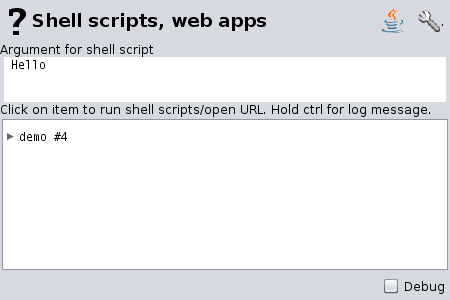Integration of Metannogen into Applications
This document describes, how Metannogen is embedded into other
applications such as Cytoscape.
This document may be helpful for my colleague, who is
currently creating a Metannogen plugin for Cytoscape.
Two directions of the communication must be distinguished:
- Cytoscape talks to Metannogen: From the other application the context menu of network components (reactions, metabolites) can be opened.
Menu items in the context menu allow to create/open an annotation in Metannogen.
- Metannogen talks to Cytoscape:A context menu of a network component can be opened in Metannogen.
It contains menu items to highlight/activate/focus .... them in Cytoscape.
Cytoscape talks to Metannogen
Cytoscape needs to start the program /bin/javaws which is part of the Java installation.
It may use a library function like "exec(...)" or "system(...)".
The following demo explains the program parameters.
For testing download the following SBML file:
wget -O test.sbml.gz http://www.bioinformatics.org/strap/metannogen/demo_integration/sycamore/Lambeth.xml.gz
Start Metannogen via Javaws:
javaws "http://www.bioinformatics.org/strap/metannogen/metannogen.php?networks=test.sbml.gz&port=10118&datasetFile=myAnnotations.datasets&openOrCreateDataset=vgapdh"
If Metannogen had already been started, this command brings
Metannogen to the front and opens the annotation for "vgapdh".
Otherwise Metannogen will be started.
Now try the same command with a different reaction ID:
javaws "http://www.bioinformatics.org/strap/metannogen/metannogen.php?networks=test.sbml.gz&port=10118&datasetFile=myAnnotations.datasets&openOrCreateDataset=vldh"
Metannogen talks to Cytoscape
Reaction cross-links
Reaction cross-links can be added with the program option 'customizeAddReactionCrossLinks".
This is described in Sycamore
Context menus of network objects and IDs in text components
To watch the output of the "echo" command, we will need to
activate the Java console. To open the Java-settings type:
javaws -viewer
A customizable
dialog
to start external apps can be opened (See figure) using the context menu of tree nodes and
identifiers in text components.
The representing text of the object under the mouse pointer
(network component, annotation, identifier) is shown in the upper
text field, here "hello".
The Lower part contains external applications arranged as an expandable tree.
In the figure the collection "demo" contains for example "Example Google".
The items can be customized by an external file,
here test_shell_scripts.txt.
It contains three columns separated by tab-character or the string "%09".
- Path and display name of the item. Path separator is back-slash.
- A condition whether an item is displayed or not depending on
the current text. This is simply a regular expression. Match
means the item is displayed. Dot asterisk ".*" matches
anything and the respective items with always be visible.
- Shell script that is executed or web page to be shown in the
browser or HTTP port and data for HTTP-socket. The shell
script appears as balloon message over the tree. Asterisk is
replaced by the current text (here "Hello").
This file test_shell_scripts.txt is loaded with the program option "customizeAddScriptByRegex=http://...".
The option takes files or URLs.
javaws "http://www.bioinformatics.org/strap/metannogen/metannogen.php?networks=test.sbml.gz&port=10118&customizeAddScriptByRegex=http%3A%2F%2Fwww.bioinformatics.org%2Fstrap%2Fmetannogen%2Fdemo_integration%2Ftest_shell_scripts.txt&datasetFile=myAnnotations.datasets&openOrCreateDataset=vldh"
This mechanism can be used to add items for controlling other applications.
Web-addresses starting with "http://localhost:" will not be opened in the browser - instead the text following
the query mark is send through a socket connection.

